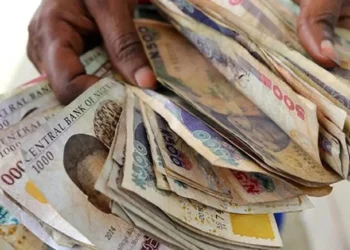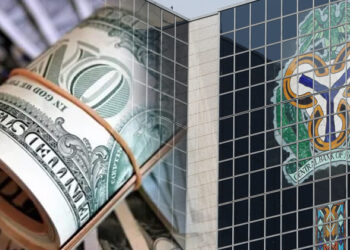Nigeria’s bond and currency markets took a hit on Monday as escalating global tensions, sparked by former U.S. President Donald Trump’s aggressive tariff proposals, triggered widespread selloffs across emerging markets.
The local financial landscape opened the week with heightened volatility. The Central Bank of Nigeria (CBN) intervened early, selling $124 million at exchange rates between ₦1,595 and ₦1,611 per dollar to curb the growing pressure on the naira. This followed a $197 million sale on Friday, indicating the apex bank’s more assertive approach to managing foreign exchange demand.
Despite the interventions, the naira struggled as demand for dollars surged and market liquidity remained tight, suggesting a persistent atmosphere of uncertainty both at home and abroad.
Bond Market Deepens in Red
On the fixed-income front, Nigeria’s Eurobonds witnessed sharp declines, with prices dropping by as much as $5 and yields climbing to 12%. This surge in yields signals an increased cost of borrowing for the country, a worrisome development as the federal government eyes the international debt market for financing.
Analysts attribute the bond market selloff not to Nigeria’s economic fundamentals, but to a wider investor retreat from risk amid fears of a renewed global trade war. The timing poses a challenge for Nigeria, as elevated borrowing costs could strain fiscal plans reliant on external loans.
Global Fallout from U.S. Tariff Push
The broader market disruption stems from Donald Trump’s recent announcement of sweeping import tariffs, including a 10% blanket duty on all U.S. imports and targeted tariffs on countries like China and Mexico. This rekindled investor fears of protectionism, sparking a global market meltdown.
Global equity markets reacted sharply. U.S. futures fell, with the S&P 500 and Nasdaq contracts sliding over 3%. Asian indices plummeted, with Hong Kong’s Hang Seng dropping more than 13%—its steepest fall in decades. European markets followed suit, with Germany’s DAX and the FTSE 100 declining sharply.
This sudden global selloff has reignited concerns over inflation, trade disruptions, and a potential slowdown in global growth. For economies like Nigeria, already grappling with currency volatility and fiscal challenges, the ripple effects are significant.
Policymakers Under Pressure
With nearly $321 million injected into the FX market in just three days, the CBN’s recent interventions highlight its commitment to stabilizing the naira. However, analysts warn that tactical responses may not be enough. Clear, consistent communication of a long-term currency strategy is needed to restore confidence.
Meanwhile, the steep rise in Eurobond yields could complicate Nigeria’s debt management, potentially increasing borrowing costs and pressuring government spending plans.
As global markets continue to reel from the tariff shock, Nigeria’s policymakers face a critical test in navigating the external headwinds while maintaining internal economic stability.










